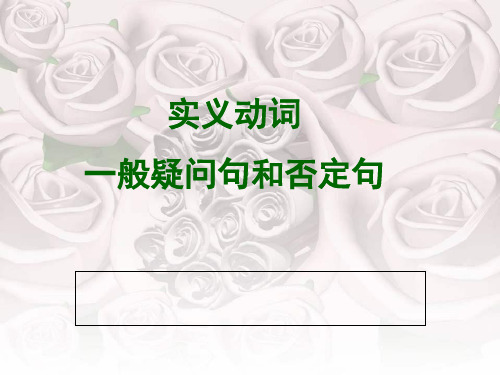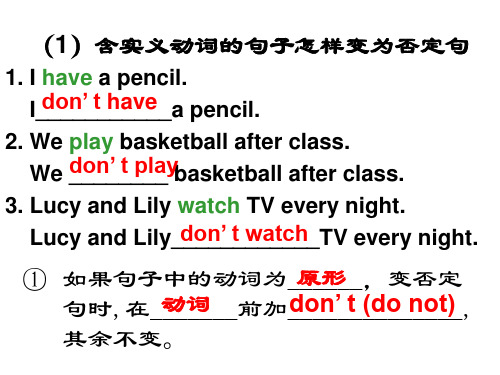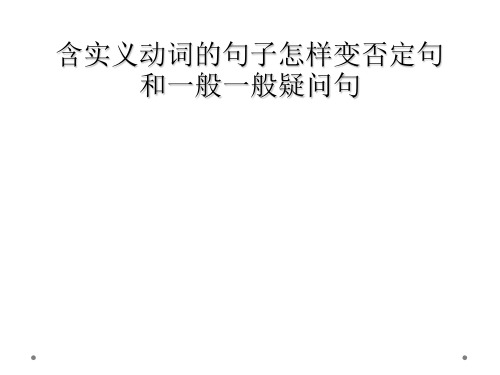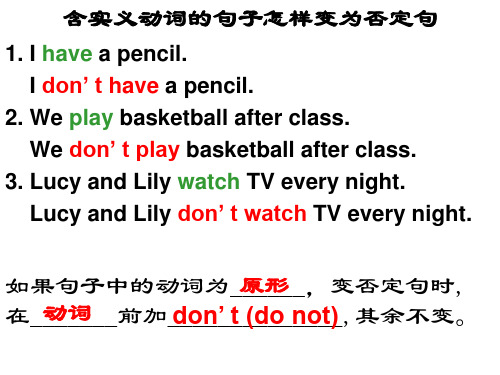含实义动词的句子怎样变否定句和一般一般疑问句ppt课件
合集下载
七上unit5含实义动词的句子怎样变否定句和一般一般疑问句

实义动词一般现在时的句型
句型形式 句型结构
例句
肯定句
主语+实义动词+… He likes English.
否定句
主语+don’t /
He doesn’t like
doesn’t +动词原形 English.
疑 一般疑 Do/Does+主语+ Does he like
问 问句 动词原形+…
English?
含实义动词的句子怎样变为否定句
1. He wants to go to Beijing. He does’ t want to go to Beijing.
2. Peter lives in Chongqing. Peter does’ t live in Chongqing.
3. Lucy knows about China. Lucy does’ t know about China.
5. Jane goes to school by bike. Does Jane go to school by bike? Yes, she does. / No, she doesn’ t.
6. Kangkang helps her study English. Does Kangkang help her study English? Yes, he does. / No, he doesn’ t.
wash---w__a_s_h_e_s fix---___fi_x_e_s__ go---__g_o__e_s__
play---__p_l_a_y_s_
study---_s_t_u_d_ie_ s carry---_c_a_r_r_ie_s
变一般疑问句的方法.docppt课件

3、在句尾加问号“?”
4、回答: 肯定: Yes , 主语+be.
否定: No, 主语+be+not.
例:I am a girl. 变成—般疑问句 :Are you a girl?
我是一个女孩。动词, 有情态动词时候
1、将提前can, could, would,may,放于句首(大写);
2、将人称变换,第一人称变第二人称 (I→you,we→you,my→your,our→your),第二人称变第一人称 (you→I,you→we,your→my,your→our),第三人称不变(一变二, 二变一,三不变)
3、在句尾加问号“?”
4、回答: 肯定: Yes , 主语+can.
否定: No, 主语+can+not.
例:They can sing and dance.变成:Can they sing and dance?
他们能唱能跳。
他们能唱能跳吗?
.
※句中没有Be动词和情态动词can的时候
1、在句首加Do或Does,当主语是第三人称单数的时候用Does,其 它都用Do
2、将人称变换,第一人称变第二人称 (I→you,we→you,my→your,our→your),第二人称变第一人称 (you→I,you→we,your→my,your→our),第三人称不变(一变二, 二变一,三不变)
3、在句尾加问号“?”
4、回答: 肯定: Yes , 主语+do/does
否定: No, 主语+do/does+not.
如果句中有some要变成→any, am→are
There are some birds in the tree.---------(Are there any birds in the tree?)
怎样变一般疑问句和否定句do或doesPPT

学习题目:一、如何变一般疑问句? 二、如何变否定句
1
二.have/has的一般疑问句:
1.)have 的一般疑问句: a. I have a book .(变一般疑问句)
Do you have a book ? b. They have many books . (变一般疑问句)
Do they have many books ?
b. She has a ping-pang bat . (变否定句句)
She doesn’t have a ping-pang bat.
c. Jane has a tennis racket . (变否定句)
Jane doesn’t have a tennis racket
小结: has的否定句:第一步,是在主语和has加上助动词 ”doesn’t” , 注意: “doesn’t” 是加上去的,不是原句里面的。 第二步,把has还原成have
3. She has a backpack . _S_h_e__d_o_e_s_n_’t_h_a_v_e_a__b_ac_k_p_a_c_k_.___________________
4. I have a bag . _I_d_o_n_’_t_h_a_v_e__a_b_a_g_.___________________________
7
❖ 句中有be(am is are)动词, 变否定句时,需要 在( be )后加not.
❖ Eg. This is a book.------- This isn’t a book ❖ It is an eraser.-------- It isn’t an eraser
6
三.将下列句子变为否定句:
1. Maria and Meimei have a room . _M_a_ri_a_a_n_d__M_e_im__e_i _d_o_n_’t_h_a_v_e_a__ro_o_m_________________
1
二.have/has的一般疑问句:
1.)have 的一般疑问句: a. I have a book .(变一般疑问句)
Do you have a book ? b. They have many books . (变一般疑问句)
Do they have many books ?
b. She has a ping-pang bat . (变否定句句)
She doesn’t have a ping-pang bat.
c. Jane has a tennis racket . (变否定句)
Jane doesn’t have a tennis racket
小结: has的否定句:第一步,是在主语和has加上助动词 ”doesn’t” , 注意: “doesn’t” 是加上去的,不是原句里面的。 第二步,把has还原成have
3. She has a backpack . _S_h_e__d_o_e_s_n_’t_h_a_v_e_a__b_ac_k_p_a_c_k_.___________________
4. I have a bag . _I_d_o_n_’_t_h_a_v_e__a_b_a_g_.___________________________
7
❖ 句中有be(am is are)动词, 变否定句时,需要 在( be )后加not.
❖ Eg. This is a book.------- This isn’t a book ❖ It is an eraser.-------- It isn’t an eraser
6
三.将下列句子变为否定句:
1. Maria and Meimei have a room . _M_a_ri_a_a_n_d__M_e_im__e_i _d_o_n_’t_h_a_v_e_a__ro_o_m_________________
含实义动词的句子怎样变否定句和一般一般疑问句

7. 3. My classmates get up at 7:00. 8. Do your classmates get up at 7:00 9. Yes, they do. / No, they don’t.
谢谢!
医学资料
• 仅供参考,用药方面谨遵医嘱
疑问句时,在句首加Does, like
然后把动词变为原形,其
余不变。
does
注:some --- any
has
I/ we --- you
wants
my/our --- your
lives
likes
Do… do… Do… have… Do… want… Do… live… Do… like…
Does… do… Does… have… Does… want… Does… live… Does… like…
1. 1. They play games on the playground. 2. They don’ t play games on the playground. 3. 2. Lucy and Lily speak English. 4. Lucy and Lily don’ t speak English. 5. 3. My classmates get up at 7:00. 6. My classmates don’ t get up at 7:00. 7. 4. He walks to school. 8. He doesn’t walk to school. 9. 5. Jane goes to school by bike. 10. Jane doesn’t go to school by bike. 11. 6. Kangkang helps me study English. 12. Kangkang doesn’t help me study English.
谢谢!
医学资料
• 仅供参考,用药方面谨遵医嘱
疑问句时,在句首加Does, like
然后把动词变为原形,其
余不变。
does
注:some --- any
has
I/ we --- you
wants
my/our --- your
lives
likes
Do… do… Do… have… Do… want… Do… live… Do… like…
Does… do… Does… have… Does… want… Does… live… Does… like…
1. 1. They play games on the playground. 2. They don’ t play games on the playground. 3. 2. Lucy and Lily speak English. 4. Lucy and Lily don’ t speak English. 5. 3. My classmates get up at 7:00. 6. My classmates don’ t get up at 7:00. 7. 4. He walks to school. 8. He doesn’t walk to school. 9. 5. Jane goes to school by bike. 10. Jane doesn’t go to school by bike. 11. 6. Kangkang helps me study English. 12. Kangkang doesn’t help me study English.
实义动词一般疑问句和否定句公开课获奖课件百校联赛一等奖课件

I have an English dictionary. 我有一本英语字典。 You have some nice jackets. 你有某些漂亮旳夹克衫。 My parents have lots of (许多)money. 我旳父母有许多钱。 They have a volleyball. 他们有一种排球。
他旳父母有诸多钱吗? Yes, they do. No, they don't. They have a volleyball. 他们有一种排球. Do they have a volleyball? 他们有一种排球吗?
Yes, they do. No, they don't.
翻译下列句子,并变为一般疑问句,并作肯定和否 定回答。
1. 我有三个排球。
2. 我们有某些乒乓球拍。
3. 她有一件漂亮旳夹克衫。
4. 爱丽丝有一条可爱旳(cute)旳小狗。
1. 5.杰克旳朋友们有某些书。 2. 6.汤姆有一本英语字典。 3. 7.我们旳李老师有一种漂亮旳女朋友。 4. 8.你们有一种棒球。
汉译英。
1. 我没有一种排球。 2. 那只狗没有左眼(left eye). 3. 我有一种宝宝,但是你们没有。 4. 李老师有一种篮球吗? 5. 那个女孩有一顶漂亮旳帽子。 6. 他们没有乒乓球拍,但是有一种乒乓球。 7. 何亚东有一种篮球,也有两块乒乓球拍。
My parents have lots of money. 我旳父母有诸多钱. My parents don't have lots of money. 我旳父母没有诸多钱.
They have a volleyball. 他们有一种排球. They don't have a volleyball. 他们没有一种排球.
他旳父母有诸多钱吗? Yes, they do. No, they don't. They have a volleyball. 他们有一种排球. Do they have a volleyball? 他们有一种排球吗?
Yes, they do. No, they don't.
翻译下列句子,并变为一般疑问句,并作肯定和否 定回答。
1. 我有三个排球。
2. 我们有某些乒乓球拍。
3. 她有一件漂亮旳夹克衫。
4. 爱丽丝有一条可爱旳(cute)旳小狗。
1. 5.杰克旳朋友们有某些书。 2. 6.汤姆有一本英语字典。 3. 7.我们旳李老师有一种漂亮旳女朋友。 4. 8.你们有一种棒球。
汉译英。
1. 我没有一种排球。 2. 那只狗没有左眼(left eye). 3. 我有一种宝宝,但是你们没有。 4. 李老师有一种篮球吗? 5. 那个女孩有一顶漂亮旳帽子。 6. 他们没有乒乓球拍,但是有一种乒乓球。 7. 何亚东有一种篮球,也有两块乒乓球拍。
My parents have lots of money. 我旳父母有诸多钱. My parents don't have lots of money. 我旳父母没有诸多钱.
They have a volleyball. 他们有一种排球. They don't have a volleyball. 他们没有一种排球.
含实义动词的句子怎样变否定句和一般一般疑问句

原形 ,变否定 ① 如果句子中的动词为______ don’ t (do not) 动词 前加______________, 句时,在_______ 其余不变。
含实义动词的句子怎样变为否定句
1. He plays soccer every day. doesn’ t play soccer every day. He ___________ 2. Peter likes English. doesn’ t like Peter ______________ English. 3. Her mother works in a school. t workin a school. Her mother doesn’ ___________
• 6. [Do/Does]______ we have a good teacher? Yes, we ____[do/does]. • 7. [Do/Does]_____ they jump rope ? No, they ___[do not/does not]. • 8. [Do/Does]_____your dog walk in the zoo? • 9. [Do/Does]____ I have a big nose? • No, you _____[do not/does not]. • 10. [Do/Does]____ your cats eat fish? Yes, they _____.[do/does].
• 一般疑问句:
Does have • 1._____the desk_____(have)four legs? • Yes,it does. Does do • 2._____she____(do)her homework every day? • Yes,she does. Does live • 3._____he_____(live)in Huanggang? • No,he doesn't. Does need • 4._____he_____(need)a pair of shoes? • NO,he doesn't.
含实义动词的句子怎样变否定句和一般一般疑问句

1. 1. They play games on the playground. 2. Do they play games on the playground? 3. Yes, they do. / No, they don’t.
4. 2. Lucy and Lily speak English. 5. Do Lucy and Lily speak English? 6. Yes, they do. / No, they don’t.
doesn’ t do doesn’ t have doesn’ t want doesn’ t live doesn’ t likdo
为原形,变一般疑问句时, have 在句首加Do,其余不变。
want
2.如果句子中的动词为第 三人称单数形式,变一般 live
2.如果句子中的动词为 like 第三人称单数形式,变
否定句时,在动词前加 does
does’ t (does not), has
然后把动词变为原形, wants
其余不变。
lives
注:some --- any
likes
don’ t do don’ t have don’ t want don’ t live don’ t like
如果句子中的动词为_第__三__人__称__单__数__形__式__, 变否定句时,在动__词__前加d_o__e_s_’ _t_(_d_o_e_s__n_o_t,) 然后把动词变为_原__形___,其余不变。
含实义动词的句子怎样变为一般疑问句
1. 1. I want to go to Beijing. 2. Do you want to go to Beijing. 3. 2. We live in Chongqing. 4. Do you live in Chongqing. 5. 3. Lucy and Lily know about China. 6. Do Lucy and Lily know about China. 7. 4. Her parents work in a school. 8. Do her parents work in a school.
含实义动词的句子怎样变否定句和一般一般疑问句

变一般疑问句,并做出肯定与否定回答 1. They play games at home. Do they play games at home ? Yes, they do. / No, they don’t. 2. Lucy and Lily speak English. Do Lucy and Lily speak English? Yes, they do. / No, they don’t. 3. My classmates get up at 7:00. Do your classmates get up at 7:00? Yes, they do. / No, they don’t.
第三人称单数形式 , 如果句子中的动词为_________________ 变一般疑问句时,在句首加 _______,然后把 Does 原形 动词变为 ______,其余不变。
含实义动词的句子怎样变否定句
1.如果句子中的动词 为原形,变否定句时, 在动词前加don’ t (do not),其余不变。 2.如果句子中的动词为 第三人称单数形式,变 否定句时,在动词前加 doesn’ t (does not), 然后把动词变为原形, 其余不变。 注:some --- any
原形 ,变一般疑问 如果句子中的动词为______ Do 其余不变。 句时,在句首加_____,
含实义动词的句子怎样变为一般疑问句
1. He has two friends. Does he have two friends? 2. Peter lives in Beijing. Does Peter live in Beijing? 3. Lucy likes China. Does Lucy like China?
含实义动词的句子怎样变为否定句
- 1、下载文档前请自行甄别文档内容的完整性,平台不提供额外的编辑、内容补充、找答案等附加服务。
- 2、"仅部分预览"的文档,不可在线预览部分如存在完整性等问题,可反馈申请退款(可完整预览的文档不适用该条件!)。
- 3、如文档侵犯您的权益,请联系客服反馈,我们会尽快为您处理(人工客服工作时间:9:00-18:30)。
如果句子中的动词为_第__三__人__称__单__数__形__式__, 变否定句时,在动__词__前加d_o__e_s_’ _t_(_d_o_e_s__n_o_t,) 然后把动词变为_原__形___,其余不变。
含实义动词的句子怎样变为一般疑问句
1. 1. I want to go to Beijing. 2. Do you want to go to Beijing. 3. 2. We live in Chongqing. 4. Do you live in Chongqing. 5. 3. Lucy and Lily know about China. 6. Do Lucy and Lily know about China. 7. 4. Her parents work in a school. 8. Do her parents work in a school.
如果句子中的动词为_原__形___,变一般疑问 句时,在句首加__D_o__,其余不变。
含实义动词的句子怎样变为一般疑问句
1. 1. He wants to go to Beijing. 2. Does he want to go to Beijing. 3. 2. Peter lives in Chongqing. 4. Does Peter live in Chongqing. 5. 3. Lucy knows about China. 6. Does Lucy know about China. 7. 4. Her mother works in a school. 8. Does her mother work in a school.
Does… do…? Does… have…? Does… want…? Does… live…? Does… like…?
1. 1. They play games on the playground. 2. They don’ t play games on the playground. 3. 2. Lucy and Lily speak English. 4. Lucy and Lily don’ t speak English. 5. 3. My classmates get up at 7:00. 6. My classmates don’ t get up at 7:00. 7. 4. He walks to school. 8. He doesn’t walk to school. 9. 5. Jane goes to school by bike. 10. Jane doesn’t go to school by bike. 11. 6. Kangkang helps me study English. 12. Kangkang doesn’t help me study English.
doesn’ t do doesn’ t have doesn’ t want doesn’ t live doesn’ t like
含实义动词的句子怎样变一般疑问句
1.如果句子中的动词
do
为原形,变一般疑问句时, have 在句首加Do,其余不变。
want
2.如果句子中的动词为第 三人称单数形式,变一般 live
疑问句时,在句首加Does, like
然后把动词变为原形,其
余不变。
does
注:some --- any
has
I/ we --- you
wantsmy/ouBiblioteka --- yourlives
likes
Do… do…? Do… have…? Do… want…? Do… live…? Do… like…?
如果句子中的动词为_原__形___,变否定句时, 在_动__词____前加_d_o_n__’ _t _(d__o_n__o_t_) ,其余不变。
含实义动词的句子怎样变为否定句
1. 1. He wants to go to Beijing. 2. He does’ t want to go to Beijing. 3. 2. Peter lives in Chongqing. 4. Peter does’ t live in Chongqing. 5. 3. Lucy knows about China. 6. Lucy does’ t know about China. 7. 4. Her mother works in a school. 8. Her mother does’ t work in a school.
2.如果句子中的动词为 like 第三人称单数形式,变
否定句时,在动词前加 does
does’ t (does not), has
然后把动词变为原形, wants
其余不变。
lives
注:some --- any
likes
don’ t do don’ t have don’ t want don’ t live don’ t like
含实义动词的句子怎样变为否定句
1. 1. I want to go to Beijing. 2. I don’ t want to go to Beijing. 3. 2. We live in Chongqing. 4. We don’ t live in Chongqing. 5. 3. Lucy and Lily know about China. 6. Lucy and Lily don’ t know about China. 7. 4. Her parents work in a school. 8. Her parents don’ t work in a school.
如果句子中的动词为_第__三__人__称__单__数__形__式__, 变否定句时,在句首加_D__o_e_s__,然后把动词 变为_原__形___,其余不变。
含实义动词的句子怎样变否定句
1.如果句子中的动词 do
为原形,变否定句时, have
在动词前加don’ t want
(do not),其余不变。 live
含实义动词的句子怎样变为一般疑问句
1. 1. I want to go to Beijing. 2. Do you want to go to Beijing. 3. 2. We live in Chongqing. 4. Do you live in Chongqing. 5. 3. Lucy and Lily know about China. 6. Do Lucy and Lily know about China. 7. 4. Her parents work in a school. 8. Do her parents work in a school.
如果句子中的动词为_原__形___,变一般疑问 句时,在句首加__D_o__,其余不变。
含实义动词的句子怎样变为一般疑问句
1. 1. He wants to go to Beijing. 2. Does he want to go to Beijing. 3. 2. Peter lives in Chongqing. 4. Does Peter live in Chongqing. 5. 3. Lucy knows about China. 6. Does Lucy know about China. 7. 4. Her mother works in a school. 8. Does her mother work in a school.
Does… do…? Does… have…? Does… want…? Does… live…? Does… like…?
1. 1. They play games on the playground. 2. They don’ t play games on the playground. 3. 2. Lucy and Lily speak English. 4. Lucy and Lily don’ t speak English. 5. 3. My classmates get up at 7:00. 6. My classmates don’ t get up at 7:00. 7. 4. He walks to school. 8. He doesn’t walk to school. 9. 5. Jane goes to school by bike. 10. Jane doesn’t go to school by bike. 11. 6. Kangkang helps me study English. 12. Kangkang doesn’t help me study English.
doesn’ t do doesn’ t have doesn’ t want doesn’ t live doesn’ t like
含实义动词的句子怎样变一般疑问句
1.如果句子中的动词
do
为原形,变一般疑问句时, have 在句首加Do,其余不变。
want
2.如果句子中的动词为第 三人称单数形式,变一般 live
疑问句时,在句首加Does, like
然后把动词变为原形,其
余不变。
does
注:some --- any
has
I/ we --- you
wantsmy/ouBiblioteka --- yourlives
likes
Do… do…? Do… have…? Do… want…? Do… live…? Do… like…?
如果句子中的动词为_原__形___,变否定句时, 在_动__词____前加_d_o_n__’ _t _(d__o_n__o_t_) ,其余不变。
含实义动词的句子怎样变为否定句
1. 1. He wants to go to Beijing. 2. He does’ t want to go to Beijing. 3. 2. Peter lives in Chongqing. 4. Peter does’ t live in Chongqing. 5. 3. Lucy knows about China. 6. Lucy does’ t know about China. 7. 4. Her mother works in a school. 8. Her mother does’ t work in a school.
2.如果句子中的动词为 like 第三人称单数形式,变
否定句时,在动词前加 does
does’ t (does not), has
然后把动词变为原形, wants
其余不变。
lives
注:some --- any
likes
don’ t do don’ t have don’ t want don’ t live don’ t like
含实义动词的句子怎样变为否定句
1. 1. I want to go to Beijing. 2. I don’ t want to go to Beijing. 3. 2. We live in Chongqing. 4. We don’ t live in Chongqing. 5. 3. Lucy and Lily know about China. 6. Lucy and Lily don’ t know about China. 7. 4. Her parents work in a school. 8. Her parents don’ t work in a school.
如果句子中的动词为_第__三__人__称__单__数__形__式__, 变否定句时,在句首加_D__o_e_s__,然后把动词 变为_原__形___,其余不变。
含实义动词的句子怎样变否定句
1.如果句子中的动词 do
为原形,变否定句时, have
在动词前加don’ t want
(do not),其余不变。 live
